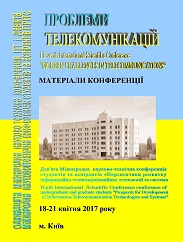ВИКОРИСТАННЯ ДВОСКАЧКОВИХ MPR ВУЗЛІВ В ПРОТОКОЛІ OLSR БЕЗПРОВОДОВИХ AD-HOC МЕРЕЖ
Анотація
Many scientific papers and researches devoted to the downloading of wireless Ad-Hoc network service information that ensures their operation. OLSR protocol is based on a progressive solution, using MPR nodes reduces the impact of the problem at times. We provide improvement of this protocol with implementation of 2-hop MPR nodes and additional state in which components that were not selected as MPR can only send TC messages, but not generate them.
Багато наукових праць і досліджень присвячено проблемі завантаження безпроводових Ad-Hoc мереж службовою інформацією, яка забезпечує їх функціонування. Протокол OLSR базується на прогресивному рішенні, використанні MPR вузлів, що в рази зменшує вплив даної проблеми. В роботі пропонується вдосконалення даного протоколу введененням двоскачкових MPR вузлів та додаткового стану, при якому вузли, які не були обрані як MPR можуть передавати ТС повідомлення, але не генерувати їх.
Посилання
T. Clausen, Ed., P. Jacquet, Ed. Optimized Link State Routing Protocol (OLSR), RFC 3626 // Project Hipercom, INRIA October 2003.
T. H. Clausen, G. Hansen, L. Christensen, and G. Behrmann The optimized link state routing protocol, evaluation through experiments and simulation // Proceedings of the IEEE conference on Wireless Personal Multimedia Communications (WPMC). — October 2001 (Електронний ресурс: http://citeseerx.ist.psu.edu/viewdoc/download?doi=10.1.1.4.3226&rep=rep1&type=pdf
##submission.downloads##
Як цитувати
Номер
Розділ
Ліцензія
Авторське право (c) 2017 Олександр Олександрович Литвин, Володимир Васильович Максимов

Ця робота ліцензується відповідно до Creative Commons Attribution 4.0 International License.
Authors who submit to this conference agree to the following terms:a) Authors retain copyright over their work, while allowing the conference to place this unpublished work under a Creative Commons Attribution License, which allows others to freely access, use, and share the work, with an acknowledgement of the work's authorship and its initial presentation at this conference.
b) Authors are able to waive the terms of the CC license and enter into separate, additional contractual arrangements for the non-exclusive distribution and subsequent publication of this work (e.g., publish a revised version in a journal, post it to an institutional repository or publish it in a book), with an acknowledgement of its initial presentation at this conference.
c) In addition, authors are encouraged to post and share their work online (e.g., in institutional repositories or on their website) at any point before and after the conference.

